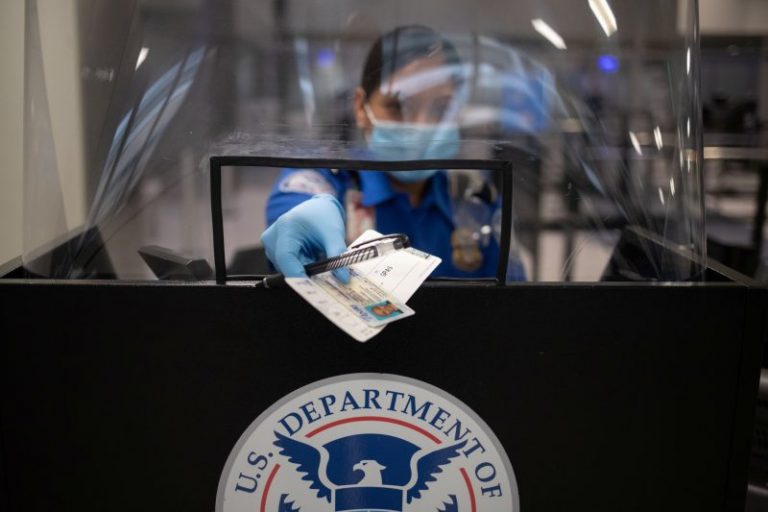Uncle Sam played Santa Claus over the holidays, delivering a sack of long-awaited gifts to the federal transportation security officers who work to keep air travel safe.
Cash is always a safe gift and the officers, who screen travelers at airports, will soon enjoy a bountiful pay raise that was included in the $1.7 trillion omnibus spending package President Biden signed into law last week. Another major workforce goody, expanded collective bargaining rights, took effect Dec. 30.
Excluding new hires, the average officer will receive a 28 percent pay raise, about a $13,000 annual boost, beginning in July. The increase is even fatter with federal locality pay. With percentage increases based on location, the officers’ pay would range from $37,695 in Jackson Hole, Wyo. to $91,496 in high-priced San Francisco. Only a small percentage of officers will be at that top amount.
The 28 percent hike is the largest federal pay bump in at least 30 years and probably ever, according to the federal Office of Personnel Management.
This pleases not only the 45,000 security officers (who screened more than 2 million air passengers on Thursday) and other Transportation Security Administration employees, but also Bennie G. Thompson (D-Miss.), who pushed hard for the raise as House Homeland Security Committee chairman, a post he held until this month.
“For over 15 years, I have led efforts to address disparities facing TSA’s Transportation Security Officers, who have kept our skies safe but are among the lowest paid workers in federal government without the same workforce rights,” Thompson said, describing the raise as “by far the biggest advancement for the workforce in TSA’s history.”
The expanded workforce rights, administratively issued in a December “Determination” by TSA Administrator David P. Pekoske, rescind severely restricted collective bargaining rules imposed, ironically, by Pekoske when Donald Trump was president. Pekoske was renominated to the post by Biden, whose pro-union policies are a hallmark of his presidency.
Under Trump, TSA collective bargaining topics “got rolled back to almost nothing,” said Johnny Jones, secretary-treasurer of the American Federation of Government Employees TSA Council 100. “Now that we’re under the Biden administration,” he said, “it’s set to open up to almost all collective bargaining rights.”
But this put Pekoske in the strange position of overseeing starkly different approaches to labor-management relations. So, what does he really believe?
His enforcement of opposing policies was dictated by the “pure practicality” of funding support from the Trump and Biden administrations for collective bargaining, Pekoske said in a telephone interview while visiting a Las Vegas airport checkpoint. Biden supports unions and backed that policy with money. Trump didn’t.
“The Biden administration took a very different perspective on that,” Pekoske said, “and one that I fully support.”
Better pay was “truly a necessity in terms of simple fairness and parity for our employees,” he said, “but also an operational necessity.” With current pay levels, he said, “it’s very hard … to recruit and hire new employees into the agency and also to retain the talent that we do have.”
The pay hike will cost the federal government about $1.4 billion annually, Pekoske said, “which in and of itself shows the great disparity in pay the TSA employees were working under for many, many years.”
It’s worth it because higher pay and stronger bargaining rights also will have a “direct impact on the public” at airport screening points through “improved workplace climate and the general morale of our front line employees,” he added. “I think the public will see that as they go through.”
Now, TSA morale stinks.
Out of 432 comparable federal agencies, TSA ranked 426 in employee engagement and satisfaction in the Partnership for Public Service’s and the Boston Consulting Group’s 2021 Best Places to Work in the Federal Government report, which is based on OPM surveys. Pekoske wants “TSA at the top of the best places to work in government.”
Biden pushed for TSA’s expanded bargaining rights with an April 26, 2021 executive order declaring that “it is the policy of my Administration to encourage worker organizing and collective bargaining.” Homeland Security Secretary Alejandro Mayorkas implemented that weeks later in a memo to Pekoske that outlined three areas “that will benefit the workforce and strengthen the organization.”
In addition to broader bargaining rights, Mayorkas’s memo said airport screeners should be “paid at a level that is no less than that of their counterparts” and TSA employees, like other feds, should have the right to appeal management personnel actions through the Merit Systems Protection Board, a quasi-judicial federal agency. That was achieved with a September agreement between TSA and the board.
These legislative and administrative actions finally bring TSA working conditions more in line with other agencies, while increasing the ability of employees to affect workplace policies.
“All of our brothers and sister agencies in the Department of Homeland Security all have full collective bargaining rights,” Jones said. “Border Patrol agents have it. Customs agents have it. We perform similar functions.”
But the TSA officers probably come in more direct contact with the public than those colleagues. Airport screeners, the last obstacle standing between impatient passengers and their flights, sometimes suffer the frustrations of travelers angry over procedures to keep them safe.
“We’re not searching for water and your soap bottle and deodorant,” said Hydrick Thomas, AFGE Council 100 president. “Do you think the employees get a pleasure out of patting down and going over your private area with the back of the hand? I don’t get no pleasure out of that, but we have to do what we have to do to make it safe.”

